
"Ra**i, Ra**i, Ra**i! Did you also find it uncomfortable to hear?" asks therapist and content creator Divija Bhasin in one of her viral videos that has sparked what social media users are calling the "Ra**i Revolution".
Bhasin, who frequently speaks about issues faced by women - particularly Indian women - recently posted a Reel on Instagram that has garnered over 5.4 million views so far. In the video, she explains how the word, often hurled at women as a slur, has now lost its sting for her.
Why? Because, as she puts it, "Men called me that word every single day in my comment section."
So, when Bhasin made the video, her intention was clear: to reclaim the word, not as a slur, but as the way men seem to use it online: to describe any woman who is "free, independent, and opinionated".
"I am a proud Ra**i. Ra**i supremacy," she declares.
She further adds that she once used to cringe at the word. "But now it makes me feel nothing. You see, men call me that every single day in my comments. It's just a word now. Earlier it referred to a sex worker and became an insult: which is ridiculous, because the insult should be directed at the men sleeping with sex workers, not at the workers themselves. But of course, there's no insult like that," she says.
'A Six-Year-Old Was Called Ra**i By Her Father'
Bhasin says when she asked her 5.22 lakh followers on Instagram to share their own experiences of being called the R-word, she was shocked by the responses, one of which came from a woman who said her father had used the R-word for her when she was just six years old.
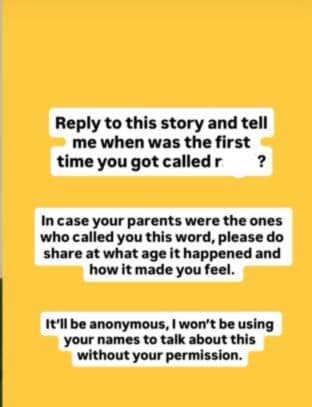
Bhasin's story. Photo: Instagram
She added that such stories are not exceptions but a grim reflection of how normalised such verbal abuse has become in India.
"This video is for all the girls who have been called ra**i, prostitute, chh****l, wh**e, or any other regional word that means the same thing. My heart goes out to you. I know how difficult it is to be called that. I have also been called this word," she says in the video.
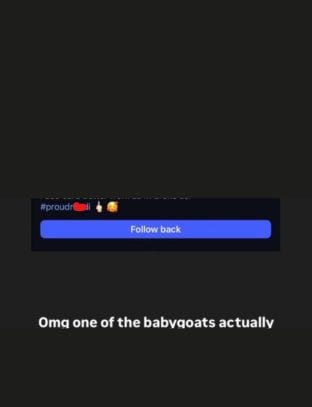
Bhasin's story. Photo: Instagram
"If you want to reduce the pain it has caused you, try reclaiming it as your own. If you've ever been called ra**i, just accept it - you're one. If you accept it, it will hurt less, because what's the worst that can happen if you do? What can they say to make you feel bad - call you ra**i again? Okay," she adds.
She then urges her followers to 'accept it' in any way they wish - in their hearts, or the way she did, by putting #ProudRa**i in her Instagram bio. That's when the controversy truly began.
#ProudRa**i
The video went viral and an Internet meltdown followed. Reactions were sharply divided: some applauded her courage, while others condemned her. X, Instagram, Reddit, it was everywhere.
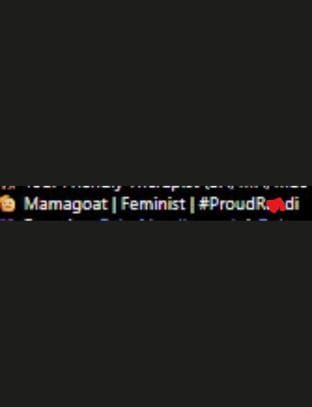
Bhasin's Instagram Bio
Things escalated when Bhasin's followers, largely women and teenage girls, began adding similar hashtags to their bios. For some, it was a symbolic act of reclaiming a slur. For others, it was an act of "disgrace."
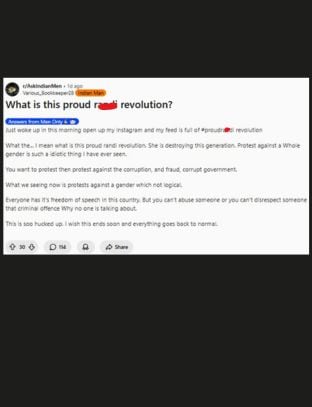
A reddit group called, r/AskIndianMen, which only allows 'answers from Men Only' discussing the viral video. Photo: Reddit
FIRs And A POCSO Complaint
One such critic, Anubhav Gupta, who describes himself as a "trader, investor, political reformer, and Sanatani Hindu", claimed on X that he had filed a POCSO (Protection of Children from Sexual Offences) complaint against her.
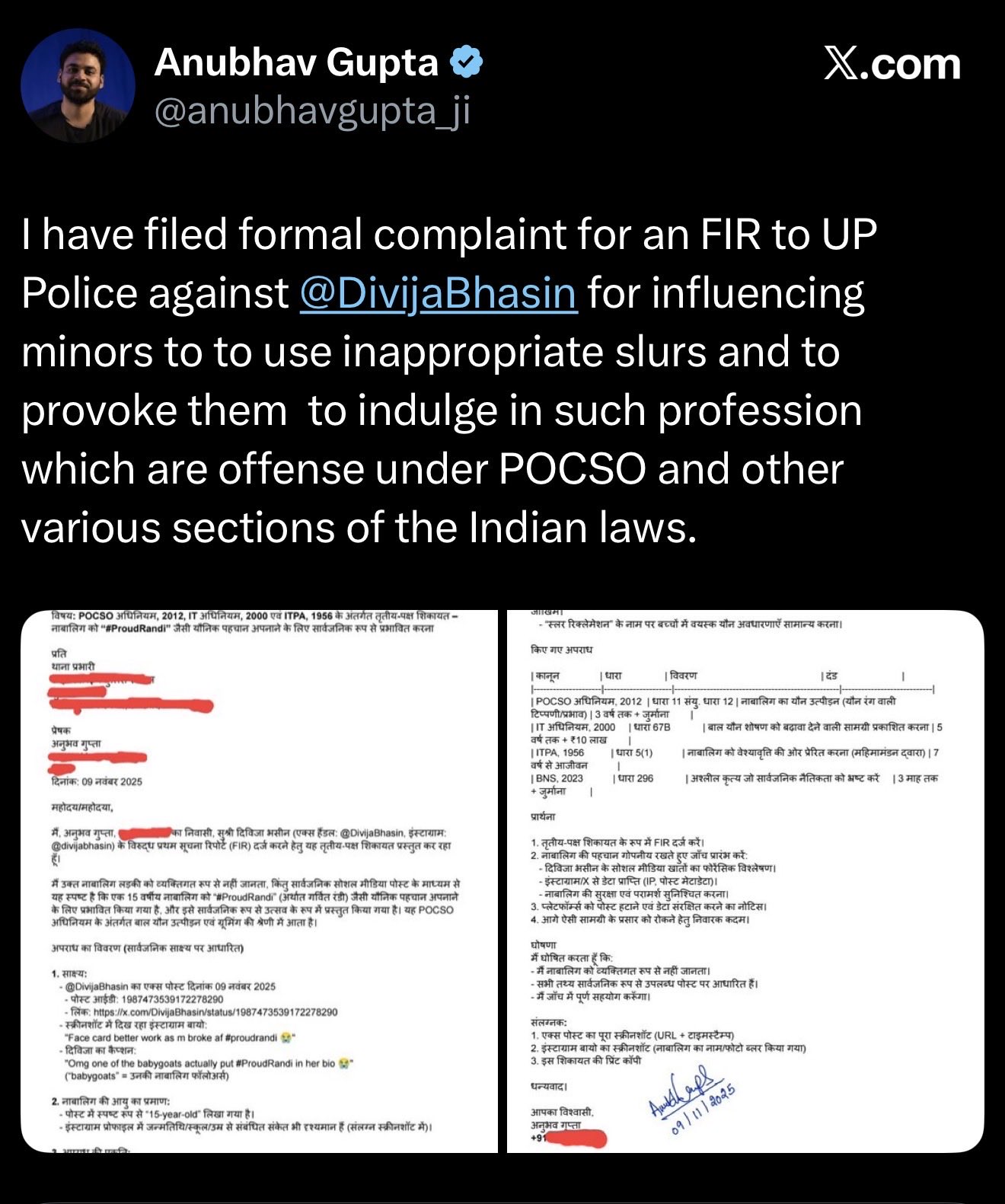
Around the same time, another X user, who goes by the handle @HindutvaNaari and identifies as an advocate at the Bombay High Court, issued a public warning to Bhasin.
"Either a public apology or I will file an FIR by tomorrow morning," she tweeted.
When Bhasin did not delete her video, the advocate claimed to have filed an FIR the next day (November 10). Moreover, Gupta also posted about having filed a formal complaint against her.
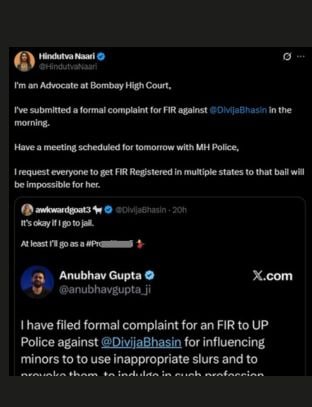
"I have filed a formal complaint for an FIR to UP Police against @DivijaBhasin for influencing minors to use inappropriate slurs and provoke them to indulge in such professions, which are offences under POCSO and various sections of Indian law," he wrote.
How Bhasin Reacted To This
Bhasin seems to be unshaken by the backlash and has been replying to these posts, stating she's willing to face the consequences.
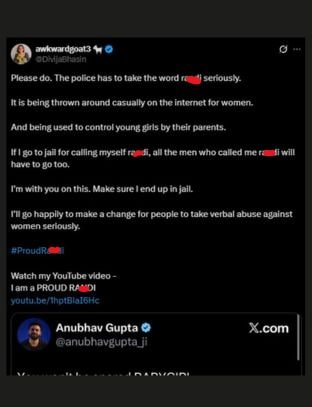
"If I go to jail for calling myself ra**i, then all the men who called me ra**i will have to go too. I'm fine with that. I'll happily go to jail if it means people will finally start taking verbal abuse against women seriously," she said.
'It Is Not Your Word To Reclaim'
Amid all the noise, debates, and polarising opinions, one thing is certain, Bhasin's video has sparked an important conversation about online misogyny, double standards, and the language used to degrade women.
Many have hailed her as brave for confronting her trolls and turning a slur into a statement of defiance. Yet others argue that her way of reclaiming it - by popularising the word through hashtags - is problematic.
"I get where Bhasin is coming from with the 'Proud R' movement, but it is not her word to reclaim. It has been used against sex workers who have faced real violence because of it. When an upper-caste woman uses it on Instagram, it's not empowering - it erases the history behind the word," says content creator Sampada Kaul.
She further adds, "I've also been called Cha**i online, but I can't go around writing 'I'm a proud Cha**i' because it's a casteist slur, and I don't have the authority to reclaim it."
The Larger Conversation
Whether one agrees with Divija Bhasin or not, the uproar surrounding her video highlights a deeper truth - that language and abuse towards women are often normalised, and women who choose to challenge it are subjected to even more scrutiny.
Reclaiming a slur is not new; it's been done by marginalised communities across the world (the most famous one is when Black people reclaimed the N-word). But where do we draw the line between empowerment and erasure? Between reclaiming and overstepping?
Bhasin's video may have opened a can of worms, but it has also forced a long, overdue discussion, about how words that were once used to shame women are now being turned back on the very system that created them.
Track Latest News Live on NDTV.com and get news updates from India and around the world

